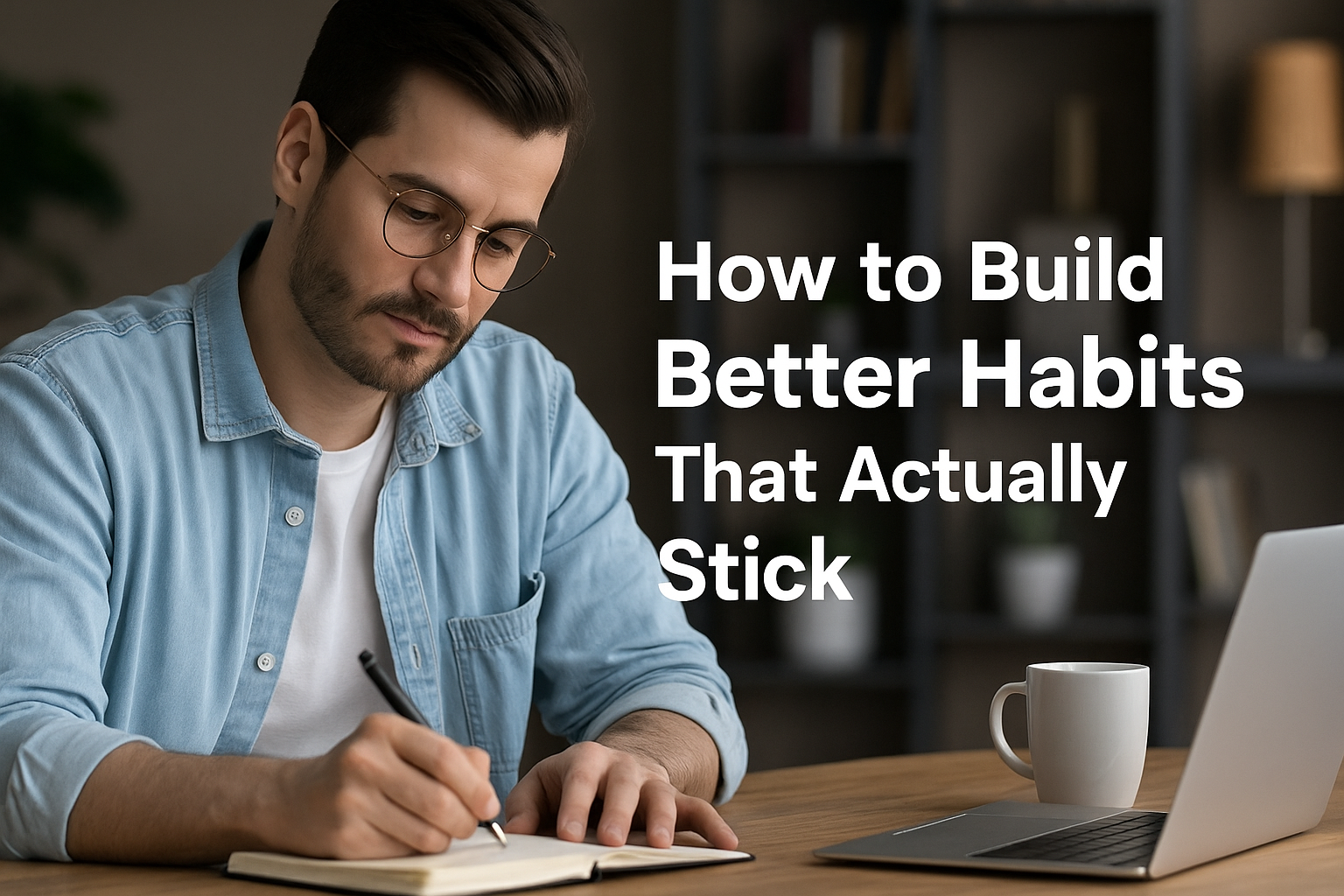Most people know what habits they want to build: exercise more, eat healthier, sleep better, be more productive. But knowing what to do isn’t the problem — it’s sticking with it. New habits often fade after a few days or weeks, leaving you feeling frustrated or like you’ve failed.
The truth is, successful habit formation isn’t about willpower — it’s about systems. When you build the right structure around a new habit, it becomes easier to follow through, even when motivation fades.
In this article, you’ll learn the psychology of habit formation and step-by-step strategies to build habits that last.
Why Most Habits Fail
Here’s why good habits often don’t stick:
- The habit is too big or unrealistic
- There’s no clear trigger to remind you
- You rely on motivation (which comes and goes)
- The environment works against the habit
- You don’t see results fast enough
To build a lasting habit, you need to make it easy, obvious, rewarding, and sustainable.
1. Start Small — Really Small
The biggest mistake people make? Starting too big. If your habit takes too much time or effort, your brain will resist it.
Instead of:
- “I’ll meditate for 30 minutes every day,” try “I’ll take 2 deep breaths after brushing my teeth.”
Small habits may seem insignificant, but they’re easier to repeat — and repetition is the key to making something automatic.
Tip:
If it feels easy enough that you can’t fail, you’re on the right track.
2. Anchor New Habits to Existing Routines
Your brain loves patterns. Use an existing habit as a trigger for a new one — this is called habit stacking.
Examples:
- After I make coffee → I’ll write 1 sentence in my journal
- After I brush my teeth → I’ll stretch for 1 minute
- After I shut down my laptop → I’ll tidy my workspace
The existing habit acts as a reliable cue for the new one.
3. Design Your Environment for Success
Your surroundings either support or sabotage your habits. Make good habits obvious and easy — and make bad habits hard to access.
Examples:
- Want to eat healthier? Put fruit in plain sight.
- Want to read more? Leave a book on your pillow.
- Want to stop scrolling? Delete apps or use screen limits.
Small environmental shifts lead to major behavior changes over time.
4. Focus on Identity, Not Just Outcomes
Don’t just set goals like “I want to lose 5kg” — focus on becoming the kind of person who acts in line with that goal.
Ask:
- “What kind of person would do this consistently?”
- “What would a healthy/organized/calm person do?”
Then behave like that person — even in small ways. Identity-based habits are more sustainable because they align with how you see yourself.
5. Use Visual Tracking
Seeing progress is a powerful motivator. Use a simple habit tracker to mark off each day you complete your habit.
Options:
- A calendar with checkmarks
- A habit tracking app
- A whiteboard on your wall
Don’t break the chain. Progress becomes visible, rewarding, and harder to ignore.
6. Make It Satisfying
If a habit feels punishing, your brain won’t want to repeat it. Add immediate rewards to make the habit satisfying.
Try:
- A small celebration (fist pump, smile, “yes!”)
- A checklist you get to complete
- Pairing the habit with something enjoyable (e.g., listening to a podcast while cleaning)
Reward fuels repetition.
7. Plan for Imperfection
You will miss days. You’ll get sick, forget, or feel off. That’s not failure — it’s part of the process.
The key? Don’t miss twice.
If you miss a day, reset the next day. Progress is about consistency, not perfection.
Say:
- “I’m learning to show up regularly, even after setbacks.”
- “Missing one day won’t ruin my progress — giving up will.”
8. Review and Adjust Monthly
Habits need to evolve with your life. Take 10 minutes at the end of each month to review:
- What’s working?
- What’s not?
- What habit do I want to start, stop, or tweak?
This keeps your system fresh and your goals aligned with your current priorities.
9. Use Accountability Wisely
You don’t have to go it alone. Telling someone about your habit or tracking progress with a friend can increase follow-through.
Ideas:
- Text a friend your daily win
- Join a challenge or support group
- Use social media for gentle public accountability
But choose wisely — avoid pressure and seek encouragement instead.
10. Let Habits Lead to Momentum
Habits don’t just change behavior — they build confidence. When you keep a promise to yourself, you prove that you’re capable of change.
That creates a domino effect:
- One 2-minute habit becomes 5, then 10
- One healthy meal turns into a routine
- One walk becomes a consistent exercise habit
Success is less about effort — and more about momentum.
Final Thought: Habits Shape Your Identity
Every time you repeat a habit, you cast a vote for the type of person you want to become.
You don’t need to be perfect.
You don’t need to be extreme.
You just need to be consistent.
Start small. Stay steady. Let time and repetition do the rest.
